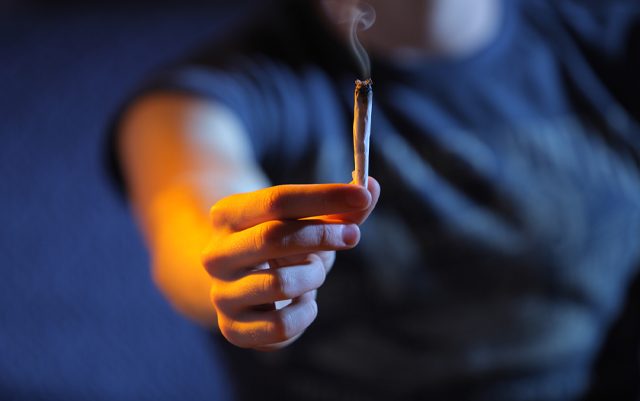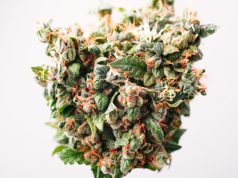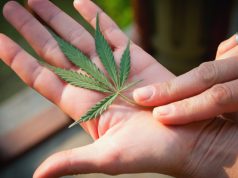A writer in Pennsylvania named Paul Muschick believes what he thinks about marijuana legalization is important – so much so that he wrote an entire op-ed about it. Fair enough; I spew my opinion on the subject here just about every day. But, as I’ve said on many occasions, no one’s opinion on marijuana legalization should matter, including mine.
Obviously we live in a world where our political system and the previous prohibition of cannabis have created certain practical realities. Some old, dead people made marijuana illegal many years ago and now we need to poll everyone ad nauseam to see what they think about maybe not having that illegality stand anymore.
Yet in the end, those who use, possess, grow and sell marijuana are not infringing on the rights of anyone else, therefore they are not committing a crime, regardless of the opinions of others. But Paul went through the trouble of writing the piece, so let’s break it down.
The best sentence is when Paul writes, “I haven’t made up my mind about legalizing recreational marijuana.” It’s ironic because the crux of his argument is that it a bunch of people telling the state’s Lieutenant Governor that weed should be legal is not a good enough reason for legalization.
His reasoning focuses mainly on his fears about what will happen after someone uses marijuana: “I’ve never smoked pot and I never intend to. I believe people should be free to do what they want with their bodies, though, and that includes lighting up. But only if their actions don’t endanger others. And only if taxpayers – such as me – aren’t asked to clean up any mess that results.
“That means people who might become full-time stoners shouldn’t be able to get state-funded addiction treatment.”
The problem with the “I don’t want to pay for stoners” line of reasoning is that it can be used for just about any substance we ingest, from opioid painkillers to cheeseburgers. I don’t want to pay for the health care of people who became obese because they choose to live on fast food. I worry someone driving and eating a cheeseburger they got from a drive-thru is not paying enough attention to the road and will hit my car. Does that mean I support a ban on fast food and drive-thrus? Of course not, because someone eating a cheeseburger is not infringing on my rights. If you don’t want the government taking your money and giving it to someone else to pay for something you don’t want to pay for, then contact your local representative and make your feelings known. Or try not paying your taxes and see how far that gets you.
Fear about what will happen *after* someone does something is not a good enough reason to criminalize people who are doing nothing wrong, and it’s a standard that can be easily abused.
Paul’s solution to all of this is more “research”. Only through more research on how marijuana use affects a myriad of different aspects of life can we collectively decide whether or not strangers who use cannabis are criminals. But how much “research” is enough? And who makes that decision? And what research do we believe if two studies or data-sets contradict each other? Who makes that decision? Paul has already established that a bunch of people wanting marijuana legal in Pennsylvania is not enough to make legalization happen, so what is the standard?
The truth is, “we need to study the issue more” is a never-ending excuse to delay action that some people don’t want to take. For some who oppose legalization, there will never be enough “proof” that cannabis should be legal. And if those people have enough power, they will do all they can to delay legalization.
So no, while what you think about cannabis prohibition may be important because of political realities, it shouldn’t be. Your opinion on the activities of adults you don’t know is irrelevant if those actions don’t infringe on your rights. That, and that alone, is why cannabis should be legal.







Marijuana prohibition does not require cannabis prohibition. Cannabis can be carefully descheduled (i.e. legalized with controls), by comprehensively reconstructing the malformed federal definition of marijuana, then marijuana can be removed from Schedule 1.
Those old dead people who prohibited marijuana also unjustly aggrandized marijuana prohibition to include cannabis prohibition. They did it by crafting the Original Malformed definition of the Marihuana Tax Act of 1937. Later, it was placed in Schedule 1 and subtly modified in the Scheduled Malformed definition of the Controlled Substances Act of 1970, then it was significantly modified to exclude hemp in the Severely Malformed definition of the Farm Bill of 2018. Hemp also has a deceitful definition created by old people, because “hemp” refers to cannabis fibers, not THC content.
None of those federal definitions are legal under the 10th Amendment. Each of those marijuana definitions are malformed because they include these same three deceits:
1. They use the Mexican term “marihuana” instead of its anglicized form “marijuana”. That term imbues racism into the law, and misdirects law enforcement efforts, which dishonors the Constitution.
2. They adumbrate the actual meaning of marijuana with this riddle embedded within the circumlocutory text of the definition: Marijuana is what substance that is “all parts of the plant Cannabis sativa L.”, and simultaneously “does not include the mature stalks of such plant”?
That riddle enabled the definition to be misconstrued, and facilitated the pernicious federal propaganda about both marijuana and cannabis, which dishonors the Constitution.
The solution to the riddle will clearly describe how marijuana is actually derived from cannabis.
3. They subsume the legitimate federal prohibitions of cannabis use within the unjustly aggrandized prohibition of marijuana. This annulled the powers, rights, privileges, and immunities of states, people, and citizens to control cannabis use, which dishonors the Constitution.
Specifying the legitimate prohibitions that are derived from the 2nd, 9th, 10th, and 14th Amendments, will create a perimeter of limited federal prohibitions that restore, protect, and encompass the states’ quality controls for legal use of carefully descheduled cannabis by citizens.
Despite the judiciary’s willful ignorance, the persistent deceits of the imbued racism, the adumbrating riddle, and the subsuming of legitimate cannabis use prohibitions, are proof that each of the malformed federal definitions of marijuana have never been “necessary and proper” federal laws, which the Constitution requires.
We the People can contact our members of Congress about reconstructing the current malformed definition to eliminate its deceits so that it literally upholds the Constitution, and carefully deschedules cannabis while retaining the Schedule 1 status of marijuana itself for separate consideration, which could come quickly, like this:
The term “marijuana” means all parts of the smoke produced by the combustion of the plant Cannabis sativa L., which is, as are the viable seeds of such plant, prohibited to be grown by or sold by any publicly traded corporation or subsidiary company, and such smoke is prohibited to be inhaled by any child or by any person bearing any firearm, as is their intake of any part or any product of such plant containing more than 0.3% THC by weight unless prescribed to such child by an authorized medical practitioner.
After the definition is legislatively reconstructed to eliminate the deceits, then the reparations can begin, such as re-evaluating the adulterated medical value that marijuana actually derives from cannabis to determine whether to also deschedule that “other substance”, or to merely reschedule it. As well, many marijuana convictions may be invalidated, and social justice components can be created.